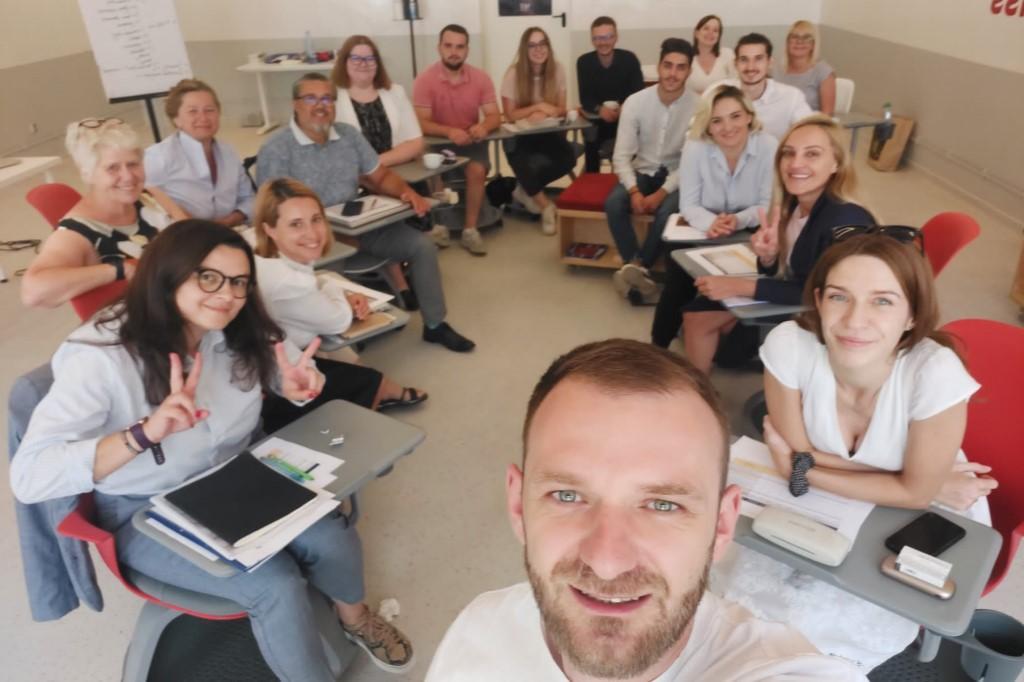
Pregătindu-mi cursul din acest an de la Universitatea din Lausanne, fiul meu, antreprenor în IT, mi-a spus sec văzând ce fac: „Lasă Google şi încearcă ChatGPT”. Habar nu aveam de această... aplicaţie. Aşa a început noua mea colaborare la limita plagiatului cu această aplicaţie diabolică. Şi dacă tot există, atunci de ce să nu o punem la treabă şi împreună să ne uităm spre viitor? Aşadar, în loc să scriu o întrebare pe Google, am scris-o pe ChatGPT. Nu am încercat să fiu scurt, concis, aşa cum am fost învăţaţi: nu am căutat de unul singur, am întrebat.
Pe cine? Pe maşină! Şi aşa am aflat de acest... miracol. El, care este pe buzele tuturor geek-ilor, tuturor dezvoltatorilor, dar şi ale jurnaliştilor: ChatGPT. Odată cu aceasta, limbajul natural, ca o nouă abordare a internetului, are potenţialul de a schimba totul. În primul rând, pentru că, datorită instrumentului creat de OpenAI, sunt din nou entuziasmat să testez pur şi simplu o maşină şi să fiu surprins de capacităţile sale. În al doilea rând, pentru că, dacă în anii 2000 internetul necesita un minim de efort pentru a tasta corect căutările şi a selecta sursele potrivite, utilizarea ChatGPT nu necesită niciun efort. Mai mult decât o interfaţă web, este un asistent care sortează, rezumă, clarifică, compară, consiliază şi planifică.
Economiile de timp pe care le realizează sunt uriaşe. ChatGPT este unul dintre acele momente rare în inovare în care vezi o licărire a modului în care totul va fi diferit în viitor. Predicţiile globale pentru 2023 variază în funcţie de domeniu şi de evoluţiile politice, sociale şi economice din întreaga lume. Schimbările bruşte în capacitatea de producţie a întreprinderilor s-au ciocnit cu schimbări bruşte în mixul de bunuri şi servicii pe care consumatorii doreau să le cumpere, ceea ce a dus atât la excese, cât şi la lipsuri în întreaga economie. O consecinţă neaşteptată a pandemiei a fost şi „dispariţia” din piaţa muncii a milioane de oameni, dispariţie încă greu de explicat, iar „trasabilitatea” forţei de muncă a devenit şi mai opacă. Creşterea salariilor este neobişnuit de rapidă, ca urmare a neconcordanţei între numărul mare de posturi vacante şi numărul de lucrători disponibili, ceea ce ar putea fi o oportunitate pentru companii în reducerea angajărilor fără a afecta economia. Totuşi, este important să se ţină cont de faptul că numai în SUA 250.000 de americani depun în fiecare săptămână cerere de ajutor de şomaj, în comparaţie cu 6,5 milioane de angajaţi lunar, ceea ce eclipsează numărul concedierilor anunţate. Îngrijorătoare sunt şi starea sănătăţii mintale, starea emoţională şi stresul extrem pe care-l trăim. În plus, constatăm că fragilitatea societăţilor noastre a ajuns la cote alarmante. Anul acesta este un an de profunde schimbări în nenumărate domenii. Faţă de toate acestea, sfârşitul lui 2022 şi începutul lui 2023 au însemnat începutul unei revoluţii informatice majore. Suntem contemporanii naşterii uneia dintre cele mai spectaculoase schimbări ale erei digitale şi se pare că încă nu suntem total conştienţi de aceasta. Poate că cel mai nebunesc lucru este că nici COVID, nici inflaţia, nici războiul din Ucraina, nici un alt factor geopolitic nu a putut opri creşterea investiţiilor în inteligenţa artificială.
Între 2020 şi 2021, investiţiile s-au mai mult decât dublat, de la 35 la 95 de miliarde de dolari investiţi în mai puţin de 12 luni. 2022 însă a accelerat si mai mult acest proces şi – se pare - 2023 va depăşi orice imaginaţie. Chiar dacă SUA domină sectorul, acest vârf de investiţii poate fi găsit în toate zonele geografice ale lumii. Puţini oameni îşi dau seama, dar în câţiva ani inteligenţa artificială va fi la fel de răspândită ca şi internetul. Pentru că inteligenţa artificială nu se va limita la îmbunătăţirea tehnologiei actuale, ci o va reinventa. Această piaţă generează deja un munte de bani şi acesta este doar începutul! Să spunem că aceasta este o piaţă cu o creştere mare este puţin spus. În 2017, piaţa de software de inteligenţă artificială valora doar 2,75 miliarde de dolari. Cu toate acestea, previziunile pentru 2025 sunt uluitoare: 78 de miliarde de dolari. Asta înseamnă o creştere de 28 de ori în doar 8 ani! De fapt, nu există nicio industrie care să crească atât de repede. Piaţa cipurilor de inteligenţă artificială (semiconductori) este la fel de impresionantă. Cu doar 1,6 miliarde de dolari în 2017, previziunile sunt de 66 de miliarde de dolari până în 2025. Este de 40 de ori mai mult decât am avut în 2017.
Acest lucru implică o creştere chiar mai accelerată decât cea a software-ului de inteligenţă artificială. Piaţa se accelerează atât de repede încât există o lipsă de ingineri AI. Încă de la apariţia informaticii, mulţi oameni de ştiinţă şi ingineri au visat la inteligenţa artificială. Cu toate acestea, această presupunere a fost răsturnată de sosirea unui nou venit: ChatGPT. În acelaşi timp, au apărut şi alte inteligenţe artificiale, cum ar fi StableDiffusion sau MidJourney. În cazul lor, acestea permit crearea de imagini generate de o inteligenţă artificială. În mod evident, IA este un domeniu de interes pentru grupuri importante. De exemplu, Microsoft are în vedere o investiţie de 10 miliarde de dolari în OpenAI, compania din spatele ChatGPT. Mâine, când inteligenţa artificială va fi conectată la internet, aceasta va deveni o bombă. O bombă care va însemna, probabil, că inteligenţa artificială dezvoltată în spatele ChatGPT nu ar fi doar o consacrare a ceea ce toată lumea încearcă să dezvolte de douăzeci de ani, ci un adevărat schimbător de joc, o logică total diferită, o perturbare. La extrema opusă, ne putem imagina că instrumentul OpenAI este o doar o iluzie. Un truc de magie, atât de mare încât să treacă fără a reuşi să intre profund în viaţa noastră. Totuşi, dacă Google a declarat cod roşu în evoluţia sa, bănuiesc că nu a fost păcălit de o iluzie. Dacă Microsoft a cumpărat pe sume astronomice părţi din activul OpenAI, nu cred că pot fi acuzaţi de naivitate. ChatGPT sintetizează o grămadă de lucruri pe care oamenii le-au scris deja, uneori în bine, alteori în rău. Nu degeaba Elon Musk se numără printre fondatori, încă din 2015, chiar dacă a părăsit firma dezamăgit de noua direcţie pecuniară şi nu altruistă pe care s-a axat organizaţia. Personalitate controversată, nu se poate spune însă că Musk nu este un vizionar extraordinar. Ceea ce este şi mai ameţitor constă în capacitatea acestei „maşini diabolice” de a genera coduri, adică de a ajuta în programare şi, până la urmă, de a se programa singură, ca în cele mai vizionare scenarii SF. „Tot ceea ce o persoană îşi poate imagina, alţii vor putea pune în practică”, scria Jules Verne. Şi dacă tot nu mă credeţi, atunci vă fac o mărturisire: am scris acest articol cu ajutorul lui ChatGPT!
Prof. Univ. Dr. Ing. Ec. Ray F. Iunius este CEO al winsedswiss education group, grup elveţian activ în domeniul educaţiei şi al consultanţei, cu sucursale în Elveţia, România, Serbia, Cipru şi Singapore. El este membru al unor consilii de supraveghere şi de administrare printre care se află Camera de Comerţ Elveţia-România, Institutul Regal de Management al Ospitalităţii şi Fundaţia IFWE de studii de sustenabilitate. Deţine un MBA şi un doctorat de la Universitatea din Lausanne şi o licenţă, masterat şi doctorat în ştiinţe tehnice de la Universitatea Transilvania din Braşov. De asemenea, el este profesor invitat la Facultatea de Înalte Studii Comerciale (HEC) a Universităţii din Lausanne - Elveţia, unde predă Strategic Service Operation în cadrul programelor de licenţă şi masterat.
sursa: businessmagazin.ro
Previous article

The first generation of students of the ohma Oradea hospitality academy took the final exam, consisting of preparing the opening of a hotel or restaurant
This week, students of the Hotel Administration and Culinary Arts programmes from the ohma academy in Oradea, operated under the license "Vocational Education and Training by Ecole hôtelière de Lausanne", successfully passed two exams that tested their skills developed over a year and a half.
Posted on 22/07/2022
Posted on 03/02/2023

Stay up-to-date with our latest news by subscribing to our newsletter
(C) Copyright 2024
Website & data hosted and managed by Winsed.swiss Education Group (WEG) SA


